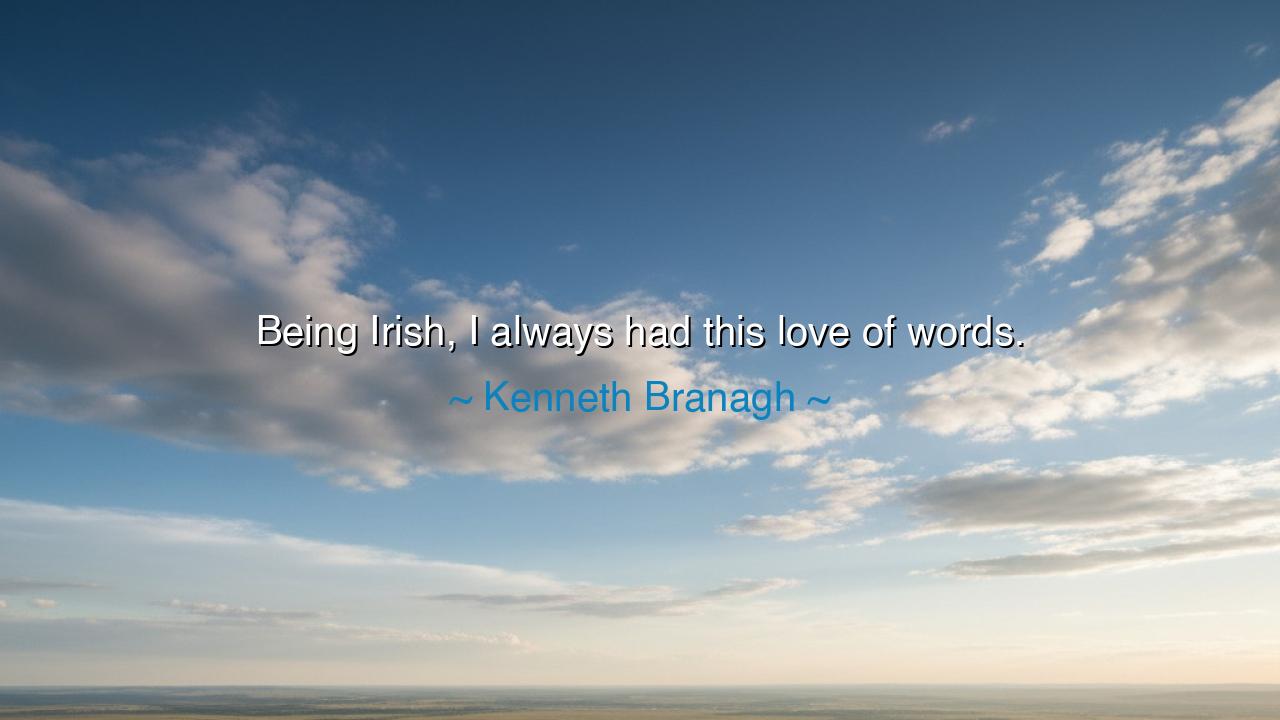
Being Irish, I always had this love of words.






Hearken, O lovers of wisdom and speech, to the words of Kenneth Branagh, who said: “Being Irish, I always had this love of words.” Though spoken simply, this confession carries within it the essence of a great tradition — the marriage of language and spirit, born from a land that has long worshiped the power of storytelling. In these words lies not mere sentiment, but a truth that reaches back through centuries: that for the Irish, words are not only tools of communication, but vessels of memory, emotion, and identity.
To understand this saying, one must understand Ireland — a nation forged by language as much as by blood. Before ink touched parchment, the Irish were keepers of the spoken word. The bards and seanchaí, or storytellers, roamed the hills and hearths, bearing the songs of kings and the laments of widows, the myths of gods and the laughter of farmers. Words were their inheritance, their rebellion, and their refuge. From their lips flowed poetry that could inspire courage or soothe sorrow, and through their stories, the spirit of Ireland survived even the chains of conquest. Thus, when Branagh speaks of his “love of words,” he speaks not only as an individual, but as a descendant of this eternal lineage.
The Irish have long known that words carry power — not merely to describe, but to shape the world. In the Gaelic tongue, to bless or to curse was an act of creation, a sacred utterance. Even when foreign powers tried to silence their native speech, the Irish turned to the written and spoken word as resistance. Out of their suffering arose some of the world’s greatest voices — Yeats, Joyce, Beckett, Heaney — who transformed the struggles of their people into immortal verse. Their words were both wound and remedy, silence and song. It is from this soil that Branagh’s love of language grows — a love not learned, but inherited, pulsing like blood through the veins of every Irish soul.
Consider Branagh himself, whose life’s work reflects this reverence for the spoken word. A master of Shakespeare, he became a modern bard — translating Elizabethan poetry for new generations, infusing it with the fire of Irish feeling. In his voice, one hears not only the cadence of English verse but the rhythm of Gaelic storytelling, that musical lilt that turns speech into song. When he recites, he does not merely perform — he channels the ancient magic of his people, reminding us that language is the bridge between emotion and eternity.
Yet beneath this celebration lies a deeper wisdom: to love words is to understand that they shape our inner lives. The Irish, who have known joy and loss in equal measure, have always turned to words to bear what the heart cannot. They speak not to fill silence, but to transform it. A well-chosen phrase can heal, a story can preserve identity, and a poem can outlast death. Thus, Branagh’s love of words is not vanity — it is a recognition that language is the soul’s last defense against oblivion.
From this truth arises a timeless lesson: cherish the power of language. Learn to speak with care, to write with honesty, to listen with reverence. Words can unite or divide, wound or mend — they are sacred instruments, and those who master them become builders of the human spirit. The Irish knew this, and it is why their heritage endures even when their empires did not. Their love of words kept them human in times when humanity was most threatened.
And so, let Branagh’s words stand as a testament not only to Ireland but to all who value expression: “Being Irish, I always had this love of words.” For to love words is to love life itself — to see in every phrase a chance to connect, to remember, to create. The voice that speaks truth, the poem that heals sorrow, the story that outlives its teller — these are the treasures of civilization. Guard them well, for they are the only immortality humankind has ever truly known.






AAdministratorAdministrator
Welcome, honored guests. Please leave a comment, we will respond soon